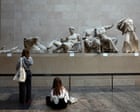
From jewellery to the Parthenon marbles, why do people collect things? And what happens when interest tips into obsession?James Delbourgo, a professor of history at Rutgers University, New Jersey, says that his latest work is less a book about collecting than it is about the “cultural idea” of collecting. Does this need illuminating? Hasn’t collecting long been seen as one of the more refined arts? A way for the educated and wealthy to show off their learning, taste, urbanity? Collectors escape the shackles of the present, throw lifelines to a disappearing past, replenish the future. Sure, says Delbourgo. But he is also interested in telling the story of how – through the ages and across continents, in the popular and sometimes political imagination – collectors have been seen as introverts and perverts, as thieves and predators, as enemies of the humanity and humanism they espouse.The major religions have always been suspicious about collecting, which they associate not with piety so much as idolatry. Why, their leaders thundered, would true believers worship objects rather than God? Artefacts – whether early coins featuring the image of Muhammad or golden and gemstone-encrusted statues of the Buddha – were inherently flawed for, as theologian John Calvin declared, “the finite cannot contain the infinite”. Yet images had the power to reach parts of illiterate societies that words alone never could. Churches invested in relics not only to attract donations and pilgrim-tourists, but to succour and solace parishioners in times of war or pestilence. Continue reading…



